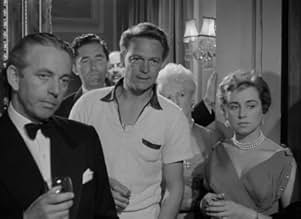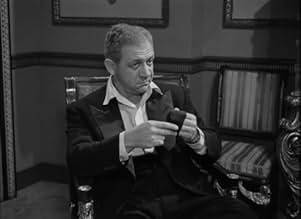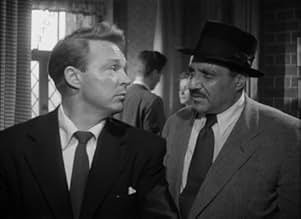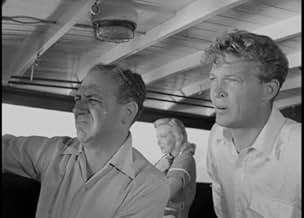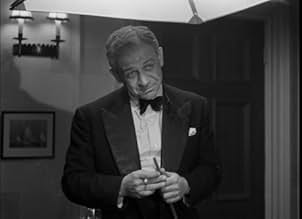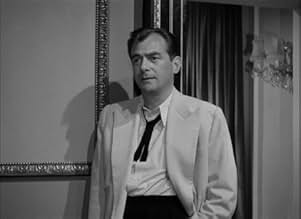An American writer living in England gets entangled in a scheme by a beautiful blonde to murder her rich husband.An American writer living in England gets entangled in a scheme by a beautiful blonde to murder her rich husband.An American writer living in England gets entangled in a scheme by a beautiful blonde to murder her rich husband.
Monti DeLyle
- Head Waiter
- (as Monti de Lyle)
Christine Adrian
- Receptionist
- (uncredited)
Jack Armstrong
- Party Guest
- (uncredited)
William Baskiville
- Party Guest
- (uncredited)
Ernest Blyth
- Editor
- (uncredited)
Harry Brunning
- Railway Porter
- (uncredited)
Dan Cressey
- Party Guest
- (uncredited)
Featured reviews
Released in the US by Lippert as "Heat Wave", The House Across The Lake (actually a more accurate title, although Heat Wave suggests some of Hillary Brooke's smoldering sensuality!) is yet another film owing a debt to both Double Indemnity and The Postman Always Rings Twice. American Alex Nicol stars as a heavy-drinking writer who lives across the lake from Hillary Brooke, a scheming Black Widow temptress who teases various men she meets while being married to a wealthy but distant husband (yes, all the cliches are here, but they play well!). Needless to say, Nicol begins a friendship with the husband while falling for the ravishing Ms. Brooke, and any lover of noir thrillers can probably predict the way the film develops. Still, it is well-played by the leads and by the British supporting cast, and Mr. Nicol convincingly portrays a man beaten-down by life, who is brought to the point where he has nothing to lose. I won't give away the ending, but it seems somewhat of a surprise while it is happening, which is what a good mystery should do, even if it is constructed from well-known plot elements of the genre. If you like post-war B&W noir-tinged mysteries of this type, it's a good way to spend 85 minutes on a rainy day--and another opportunity to re-acquaint yourselves with the two underrated American stars, Alex Nicol and Hillary Brooke (fans of Ms. Brooke should check out the early 50s gem CONFIDENCE GIRL, co-starring Tom Conway, for a real Hillary Brooke tour-de-force).
At a time when noir production was converting to TV, Lippert hooked up with England's Hammer Films. (And that's before Hammer hooked up with Dracula and Frankenstein.) Judging from this effort, budget minded Lippert got a lot more bang for their buck overseas.
Compared with traditional noir, the settings here are much more naturalistic than expressionistic. There's little of the usual menace of light and shadow. Instead, most scenes are shot on location with natural lighting, except for the climactic fog-bound sequence. This undercuts atmosphere and mood, staples of standard noir. As a result, it's the fateful story that's highlighted. And since the story is narrated in flashback, it seems the outcome is pre- determined in some metaphysical sense.
Sure, you've seen the story before, as others point out. A rich man's slutty wife (Brooke) conspires to kill him with key help from a luckless fall guy (Nicol). Sounds like Double Indemnity (1944) even down to the double-cross. Still, the screenplay is good enough to hold interest. And was there ever a more stately ice queen than Hillary Brooke. It's hard to see her ever unwinding enough for intimacy. And therein lies a problem. Too bad the film couldn't show some stage of real melt from her, like a dash of undress or even mussed-up mascara. Nicol too is pretty low-key for a guy obsessed. But then this is 1954, not exactly the anything goes of more recent vintage. In my book, it's luckless Sidney James who steals the film, with his nicely modulated peek at a doomed man. I like the way the script only later fills in why he's so seemingly indifferent to his wife's very public affairs. That way we're left really curious for a well-timed period.
Anyhow, the movie's much better than the lowly two-stars out of four that TCM rates it. Then again, maybe I'm just a sucker for any noir with a well-turned ankle.
Compared with traditional noir, the settings here are much more naturalistic than expressionistic. There's little of the usual menace of light and shadow. Instead, most scenes are shot on location with natural lighting, except for the climactic fog-bound sequence. This undercuts atmosphere and mood, staples of standard noir. As a result, it's the fateful story that's highlighted. And since the story is narrated in flashback, it seems the outcome is pre- determined in some metaphysical sense.
Sure, you've seen the story before, as others point out. A rich man's slutty wife (Brooke) conspires to kill him with key help from a luckless fall guy (Nicol). Sounds like Double Indemnity (1944) even down to the double-cross. Still, the screenplay is good enough to hold interest. And was there ever a more stately ice queen than Hillary Brooke. It's hard to see her ever unwinding enough for intimacy. And therein lies a problem. Too bad the film couldn't show some stage of real melt from her, like a dash of undress or even mussed-up mascara. Nicol too is pretty low-key for a guy obsessed. But then this is 1954, not exactly the anything goes of more recent vintage. In my book, it's luckless Sidney James who steals the film, with his nicely modulated peek at a doomed man. I like the way the script only later fills in why he's so seemingly indifferent to his wife's very public affairs. That way we're left really curious for a well-timed period.
Anyhow, the movie's much better than the lowly two-stars out of four that TCM rates it. Then again, maybe I'm just a sucker for any noir with a well-turned ankle.
Heat Wave is the American reissue title of a pretty fair British suspense drama, The House Across The Lake. It retraces the eternal noir triangle (adding English angles): Rich but rough-hewn older husband (Sidney James); duplicitous blonde trophy wife (Hillary Brooke); and the chump (Alex Nicol). There's also the optional element of the jealous daughter by the first wife (Susan Stephen), but she doesn't bring much to the tea party.
Nicol is a pulp novelist who's taken a cottage in the lake country where he sweats, drinks but doesn't make much progress on the page rolled in his typewriter. One night he gets a call from party-central across the water, a posh house called High Wray (the movie is directed by Ken Hughes from his novel of that name). Their launch is down could Nicol pick up some guests waiting at the club and ferry them up to the house?
He obliges, gets invited in for a thank-you drink, and meets Brooke, the bored, flirtatious wife; her paramour of the moment, pianist Paul Carpenter (she has a weakness for impoverished artistic types); and, later, the daughter. There are `scenes.' Hack writer or no, Nicol can't have read much James M. Cain or he'd be off to his typewriter in a flash, if not all the way back to the States.
James has a bum ticker and plans to write Brooke out of the will, but inevitably the inevitable happens: James, Brooke and Nicol go out on a fishing expedition, a heavy fog enshrouds them, there's an `accident.' (Brooke even sports Stanwyck-in-the-supermarket cheaters at the coroner's inquest.) But a police inspector (Alan Wheatley) takes an undue interest in the case....
Despite a score which quotes Debussy's Le Mer until seasickness ensues, the movie has an American feel to it (due in large part to Americans Nicol and Brooke in the leads, though Brooke's cucumber-sandwich accent would fool Henry Higgins). Its major shortcoming is an abrupt ending which leaves a little too much to be inferred, in an understated British way. Best reason for watching is Brooke, who made her mark in some Sherlock Holmes movies and against Brenda Marshall in Strange Impersonation but never got the parts her talents deserved. Heat Wave is an opportunity to watch what she could do.
Nicol is a pulp novelist who's taken a cottage in the lake country where he sweats, drinks but doesn't make much progress on the page rolled in his typewriter. One night he gets a call from party-central across the water, a posh house called High Wray (the movie is directed by Ken Hughes from his novel of that name). Their launch is down could Nicol pick up some guests waiting at the club and ferry them up to the house?
He obliges, gets invited in for a thank-you drink, and meets Brooke, the bored, flirtatious wife; her paramour of the moment, pianist Paul Carpenter (she has a weakness for impoverished artistic types); and, later, the daughter. There are `scenes.' Hack writer or no, Nicol can't have read much James M. Cain or he'd be off to his typewriter in a flash, if not all the way back to the States.
James has a bum ticker and plans to write Brooke out of the will, but inevitably the inevitable happens: James, Brooke and Nicol go out on a fishing expedition, a heavy fog enshrouds them, there's an `accident.' (Brooke even sports Stanwyck-in-the-supermarket cheaters at the coroner's inquest.) But a police inspector (Alan Wheatley) takes an undue interest in the case....
Despite a score which quotes Debussy's Le Mer until seasickness ensues, the movie has an American feel to it (due in large part to Americans Nicol and Brooke in the leads, though Brooke's cucumber-sandwich accent would fool Henry Higgins). Its major shortcoming is an abrupt ending which leaves a little too much to be inferred, in an understated British way. Best reason for watching is Brooke, who made her mark in some Sherlock Holmes movies and against Brenda Marshall in Strange Impersonation but never got the parts her talents deserved. Heat Wave is an opportunity to watch what she could do.
Hillary Brooke plays a beautiful woman married to a much older, wealthy man. We've seen the story in film noir before. We've seen it many times.
But this 1954 picture is well written and exceptionally well cast. Its budget is clearly not high. Yet, the chemistry could blow up a chem lab. Alex Nicol is likable as a hot-tempered writer. He happens to be trying to finish a book right near this wealthy man and his wife.
The wife is played by Hillary Brooke. She is like Kathleen Turner a few decades before Turner burst on the scene: She's sly, sexual -- and that voice! She has a deep, purring voice that has elements of Tallulah Bankhead in it.
The film resembles "The Postman Always Rings Twice." Of course, that had a pedigree of its own. The stars were good but not entirely convincing together. Brooke is less beautiful than Lana Turner but she's a more compelling performer.
And there's "Double Indemnity." It's hard to think of topping that one. Barbara Stanwyck gives a peerless performance in it. So maybe Brooke could be called, at least in this movie, the poor man's Barbara Stanwyck.
But this 1954 picture is well written and exceptionally well cast. Its budget is clearly not high. Yet, the chemistry could blow up a chem lab. Alex Nicol is likable as a hot-tempered writer. He happens to be trying to finish a book right near this wealthy man and his wife.
The wife is played by Hillary Brooke. She is like Kathleen Turner a few decades before Turner burst on the scene: She's sly, sexual -- and that voice! She has a deep, purring voice that has elements of Tallulah Bankhead in it.
The film resembles "The Postman Always Rings Twice." Of course, that had a pedigree of its own. The stars were good but not entirely convincing together. Brooke is less beautiful than Lana Turner but she's a more compelling performer.
And there's "Double Indemnity." It's hard to think of topping that one. Barbara Stanwyck gives a peerless performance in it. So maybe Brooke could be called, at least in this movie, the poor man's Barbara Stanwyck.
Surprisingly good for a budget Hammer film. Lacking the tantalising gorgeousness of Rita Hayworth or the star-power of Orson Welles and Everett Sloane in Lady from Shanghai the similarly water-borne and much more likely inspiration, the leads do well and the director/screenwriter keeps things nicely atmospheric. The plot twists are effective. But overall the plot lacks the complexity, novelty and power of Lady from Shanghai and the ending is sudden and perfunctory. And ungallant though it might be to say so, the film's femme fatale it has to be said is mature to the point of being a femme mildly injurious but certainly is not lacking in the dramatic stakes.
A 6.5 Seen on Talking Pictures TV
A 6.5 Seen on Talking Pictures TV
Did you know
- TriviaCertain scenes must have been cut, as some prominently listed cast members (John Sharp, Joan Hickson, Monti de Lyle) are barely visible in the finished film.
- GoofsDespite being set in the Lake District in England Carol drives a left hand drive car on the right side of the road. In England cards drive on the left and cars are right-hand drive.
- Quotes
Beverly Forrest: Carol's in love with Carol.
- ConnectionsFeatured in The House across the Thames (2022)
- How long is Heat Wave?Powered by Alexa
Details
- Release date
- Country of origin
- Official sites
- Language
- Also known as
- Heat Wave
- Filming locations
- The Showboat, Oldfield Road, Maidenhead, Berkshire, SL6 1TD, England, UK(Exterior of Lakeside Yacht Club)
- Production company
- See more company credits at IMDbPro
- Runtime1 hour 8 minutes
- Color
- Aspect ratio
- 1.65 : 1
Contribute to this page
Suggest an edit or add missing content

Top Gap
By what name was The House Across the Lake (1954) officially released in India in English?
Answer

